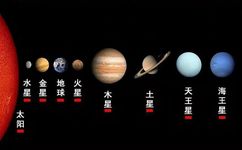
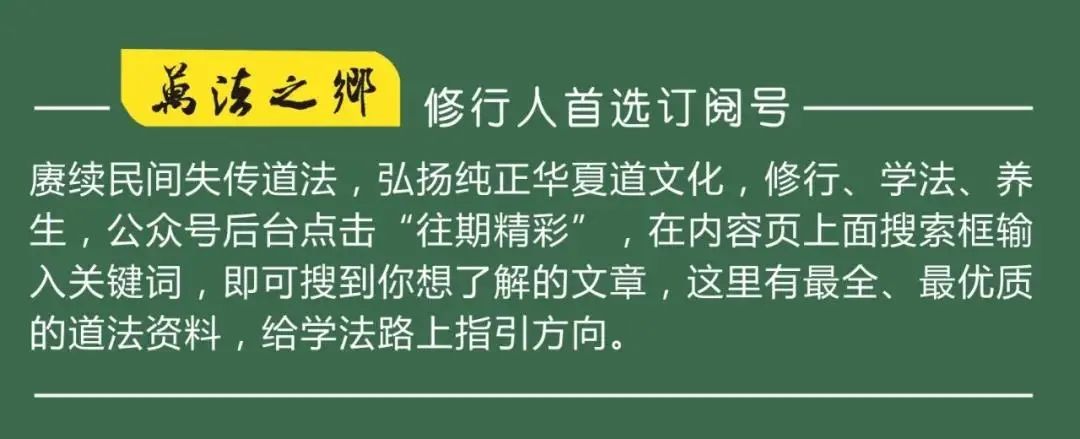

Heaven has Five Stars
.01

The five stars are the five major planets: Metal (Jin), Wood (Mu), Water (Shui), Fire (Huo), and Earth (Tu), also known as the Five Elements. Venus, known as the Morning Star, is also called Tai Bai (Great White) or Tai Bai Jin Xing (Great White Metal Star). Venus is exceptionally bright, being the brightest star in the sky after the Sun and Moon. It is an inner planet, appearing in the east at dawn (Qi Ming) and in the west at dusk (Chang Geng). Thus, the Book of Songs states, “In the east is Qi Ming, in the west is Chang Geng.” Jupiter, known as the Year Star (Sui Xing), is the largest of the five stars and one of the brightest stars at midnight. Due to its size and brightness, it was highly regarded by ancient people, who observed it completing an orbit around the sky approximately every twelve years, thus marking the years. Mercury, known as the Morning Star (Chen Xing), is the closest planet to the Sun and is often difficult to observe. Mars, known as the Wandering Star (Ying Huo), is a striking red star that varies in brightness and position, making it perplexing, hence its name. The Book of Rites states, “During the time of Duke Jing of Song, the Wandering Star guards the heart.” The Wandering Star refers to Mars. Saturn, known as the Guardian Star (Zhen Xing), is second in size and mass only to Jupiter and is surrounded by beautiful rings, often attracting special interest. It is worth noting that the Mercury and Mars frequently mentioned in ancient texts actually refer to fixed stars (i.e., the stars of the Chamber) and the Great Fire (the Heart Star), rather than the planets Mercury and Mars.
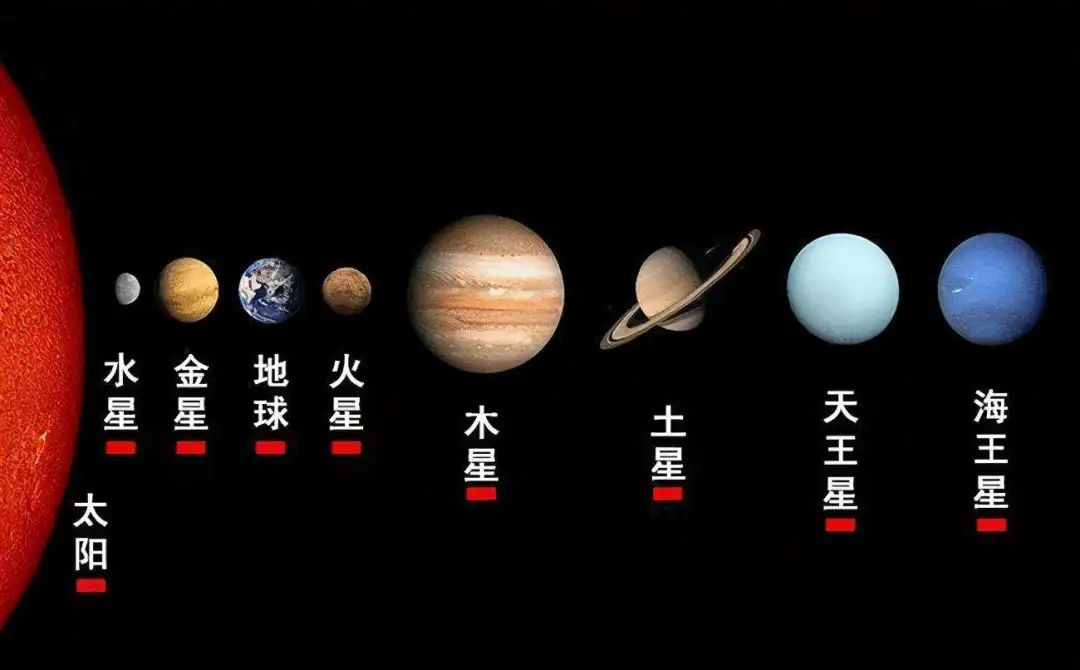
Other names include the Year Star (Mu Yao), which is the essence of Wood in the Five Elements, the son of the Azure Emperor of the East. The Wandering Star (Huo Yao) is the essence of Fire, the son of the Vermilion Emperor of the South. The Guardian Star (Tu Yao) is the essence of Earth, the son of the Yellow Emperor of the Center. The Great White Star (Jin Yao) is the essence of Metal, the son of the White Emperor of the West. The Morning Star (Shui Yao) is the essence of Water, the son of the Black Emperor of the North. These five stars have different periods of revolution around the sky: the Great White Star and the Morning Star each take one year, the Wandering Star takes two years, the Year Star takes twelve years, and the Guardian Star takes twenty-nine and a half years. When a person reaches their destined star, the auspiciousness and misfortune vary, as detailed in the “Seven Stars and Disaster Removal” which explains the methods of disaster removal. True practitioners establish mandalas and practice methods, first determining auspicious times, aligning with the vows of these celestial deities, in hopes of achieving auspiciousness and overcoming obstacles, thus fulfilling their practices.

Earth has Five Elements
.04

There exists a relationship of generation, overcoming, multiplication, and insult among the Five Elements. The generative and overcoming relationships of the Five Elements can explain the interconnections between things, while the multiplication and insult relationships can represent the mutual influences when the balance between things is disrupted. Generation refers to mutual nourishment and support. The order of generation among the Five Elements is: Wood generates Fire, Fire generates Earth, Earth generates Metal, Metal generates Water, and Water generates Wood. Overcoming refers to mutual restraint and limitation. The order of overcoming among the Five Elements is: Wood overcomes Earth, Earth overcomes Water, Water overcomes Fire, Fire overcomes Metal, and Metal overcomes Wood. Generation and overcoming are inseparable; without generation, things cannot occur or grow; without overcoming, things cannot maintain normal coordinated relationships. Only by maintaining a dynamic balance of generation and overcoming can things occur and develop normally.
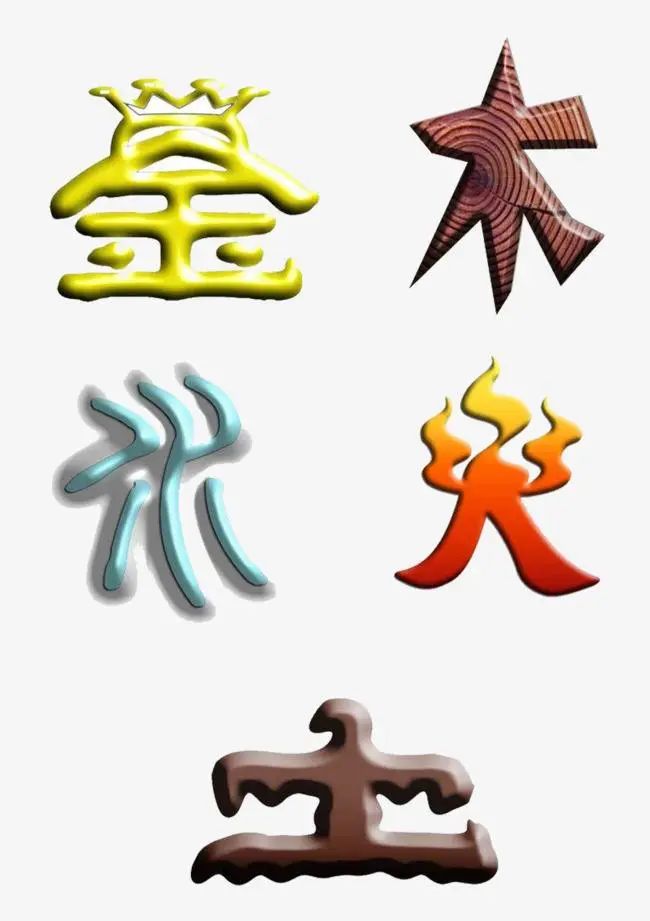

Humans have Five Organs
.05

Heaven has five stars, Earth has five mountains, the universe has five elements, and humans have five organs. Thus, the lungs are the chancellor, the spleen is the minister, the heart is the emperor, the liver is the general, and the kidneys are the noble women. The liver is associated with the gallbladder, the spleen connects with the stomach, the small intestine is linked to the heart, the large intestine is connected to the lungs, and the bladder is associated with the kidneys. Therefore, when the liver is excessive, the eyes become red; when the heart is hot, the mouth becomes dry; when the kidneys are deficient, hearing is impaired; and when the lungs are affected by wind, the nose becomes congested. The eyes correspond to the liver, the tongue corresponds to the heart, the ears correspond to the kidneys, and the nose corresponds to the lungs. The heart governs blood vessels, the lungs govern the skin, the liver governs tendons, and the kidneys govern bones. Bones rely on the strength of tendons, tendons rely on the flesh, flesh relies on the skin, and swelling of the face relates to the spleen, which is influenced by the bones. Thus, it is known that bone ailments stem from the kidneys, tendon ailments arise from the liver, flesh ailments injure the spleen, and skin ailments originate from the lungs.
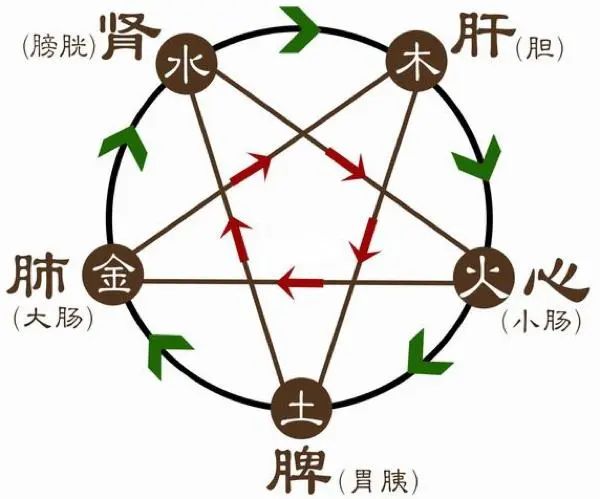
Among heaven and earth, humans are the most precious. The head is round like heaven, and the feet are flat like earth. Heaven has four seasons, and humans have four limbs. Heaven has five elements, and humans have five organs. Heaven has six laws, and humans have six bowels. Heaven has seven stars, and humans have seven orifices. Heaven has eight winds, and humans have eight joints. Heaven has twelve times, and humans have twelve meridians. Heaven has twenty-four solar terms, and humans have twenty-four acupoints. Heaven has three hundred sixty days, and humans have three hundred sixty joints. Heaven has day and night, and humans have sleep. Heaven has thunder and lightning, and humans have anger. Heaven has the sun and moon, and humans have eyes. Earth has springs, and humans have blood vessels. Earth has nine provinces, and humans have nine cavities. Earth has mountains and stones, and humans have bones and teeth. Earth has plants, and humans have hair. The four great elements and five sprouts combine to form the body. If one major element is out of balance, a hundred diseases will arise.
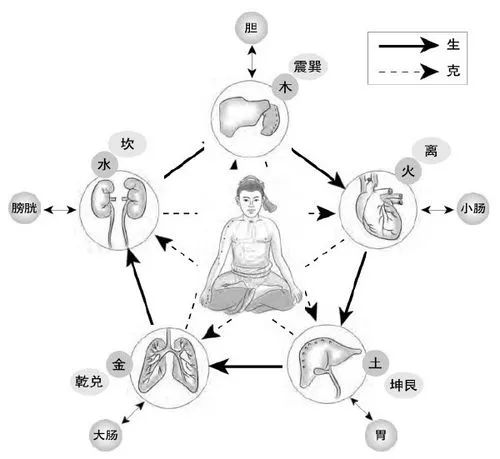

Taste has Five Flavors
.06

Sour nourishes the liver: Sour foods enhance digestive function and protect the liver. Regular consumption not only aids digestion and eliminates pathogens in the gastrointestinal tract but also prevents colds, lowers blood pressure, and softens blood vessels. Foods primarily sour, such as sour plums, pomegranates, tomatoes, hawthorn, and oranges, are rich in vitamin C, which can prevent cancer, combat aging, and treat arteriosclerosis.
Bitter nourishes the heart: There is an ancient saying that “bitter medicine is good for the mouth”; TCM believes that bitter foods can drain, dry, and strengthen Yin, having effects of eliminating dampness and promoting diuresis. Foods like tangerine peel, bitter almonds, bitter melon, and lilies can prevent toxin accumulation and treat various sores.
Sweet enters the spleen: Sweet foods can nourish Qi and blood, replenish energy, relieve fatigue, and detoxify the stomach, also having effects of alleviating spasms. Foods such as brown sugar, longan meat, honey, and grain products are good choices for sweet nourishment.
Spicy enters the lungs: TCM believes that spicy foods can induce sweating and regulate Qi. Common spicy foods like scallions, ginger, garlic, chili, and pepper can protect blood vessels and regulate Qi and blood, helping to prevent colds due to wind and cold; however, those with hemorrhoids, constipation, or kidney deficiency should avoid them.
Salty enters the kidneys: Salty is the crown of the five flavors, and it is never tiresome to eat. TCM believes that salty foods can regulate cell and blood osmotic pressure, maintaining normal metabolism. Salty flavors have effects of draining, softening, dispersing masses, and nourishing Yin and blood. Foods like salt, kelp, nori, and jellyfish are high-quality salty foods.
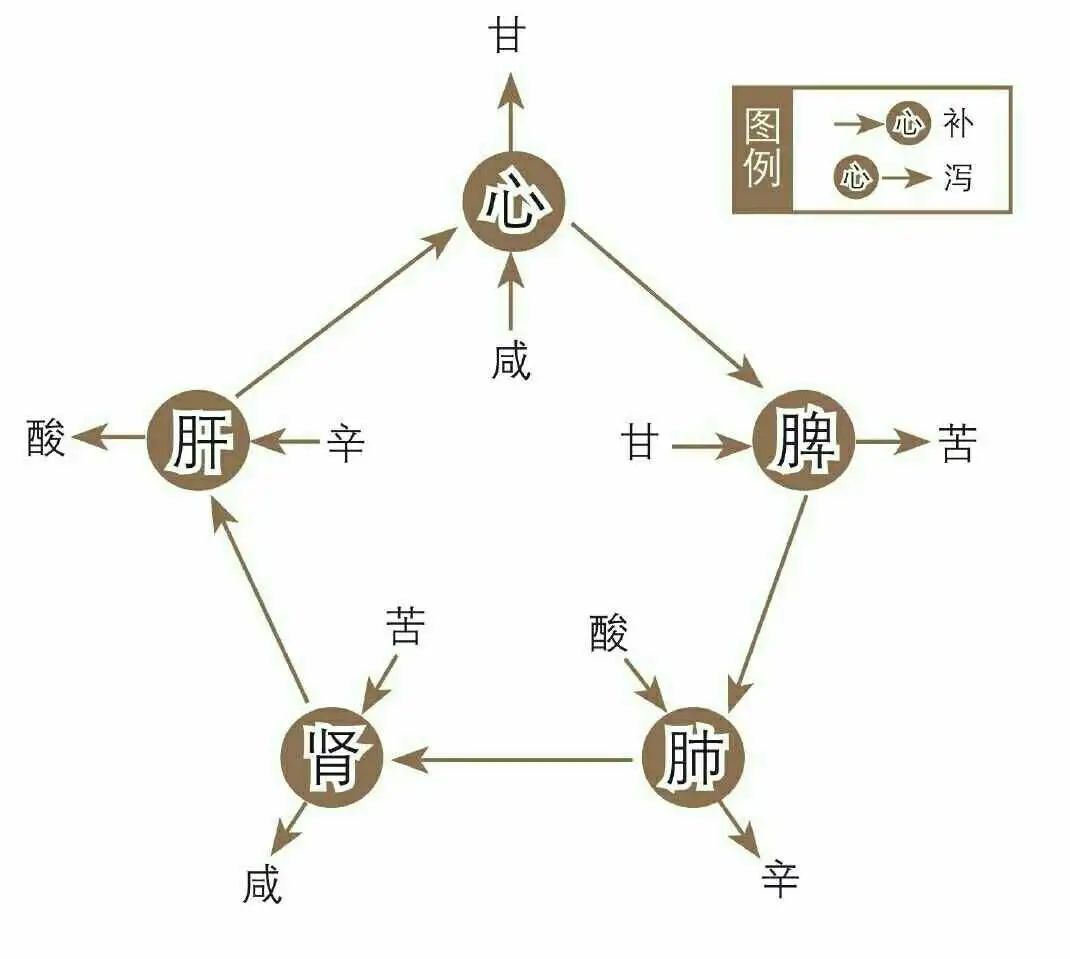

Color has Five Colors
.07

The liver corresponds to the color green: It is advisable to eat brown rice, beef, jujubes, and sunflower seeds; green corresponds to the liver, so to achieve a rosy complexion, one should not primarily consume vegetarian food.
The heart corresponds to the color red: It is advisable to eat adzuki beans, dog meat, plums, and leeks; red corresponds to the heart, thus to achieve a complexion like peach blossoms, one can supplement with foods rich in vitamin C, such as tomatoes, oranges, and red apples.
The lungs correspond to the color white: It is advisable to eat wheat, lamb, apricots, and leeks; white corresponds to the lungs, so to achieve fair skin, one can frequently consume protein-rich foods, such as soy milk and milk.
The spleen corresponds to the color yellow: It is advisable to eat soybeans and chestnuts; yellow corresponds to the spleen, so those with a dull complexion can supplement with yellow, sweet foods, such as carrots and egg yolks.
The kidneys correspond to the color black: It is advisable to eat meat, peaches, and scallions; black corresponds to the kidneys, so those with darker skin should eat less food with excessive color additives. 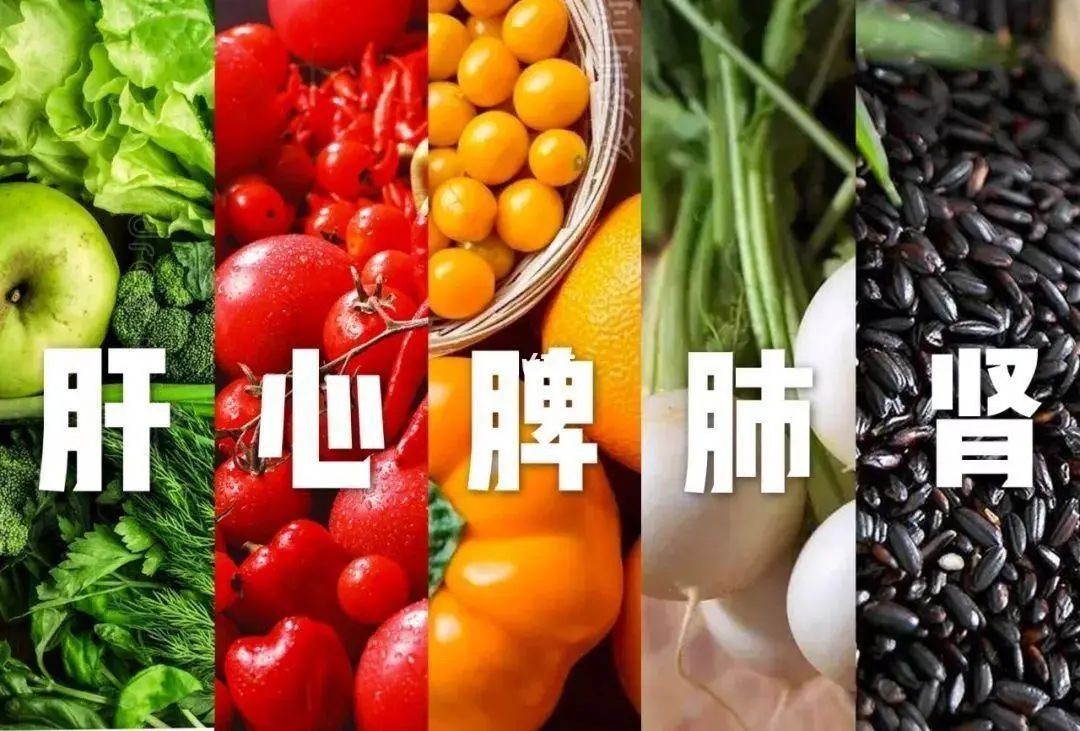

Emotions have Five Aspirations
.08

In the heart, joy is the aspiration: The physiological function and emotional state of the heart are related to joy. The Suwen states, “Joy harmonizes Qi and allows aspirations to reach, nourishing the Wei and Ying.”
In the liver, anger is the aspiration: Anger is a strong emotional response to external stimuli and is an adverse emotional stimulus. Anger is most closely related to the liver, hence it is said, “In the liver, anger is the aspiration.” On one hand, great anger can harm the liver, leading to abnormal discharge, excessive liver Qi, and blood surging with Qi, which can manifest as a red face, irritability, and in severe cases, vomiting blood, nosebleeds, sudden fainting, or loss of consciousness. On the other hand, if the liver fails to regulate, it can also lead to emotional instability, manifesting as irritability and mood swings.
In the spleen, thought is the aspiration: Thought refers to contemplation and consideration, a state of conscious mental activity. The emotional activities of thought are primarily expressed through the spleen. Thought is a highly concentrated mental state. When a person is immersed in thought or anxiety, they often experience loss of appetite and disinterest in food. Some women may experience reduced menstrual flow or irregular periods due to work stress and intense focus, which aligns with the spleen’s function of regulating blood.
In the lungs, worry (sadness) is the aspiration: Ancient physicians observed that the lungs are the main organ expressing worry and sadness. When a person cries due to sorrow, tears flow, which is the mucus secreted by the lungs. When crying, lung Qi is abundant, and mucus secretion increases, as the lungs open to the nose, causing tears to flow from the nose. The lungs govern Qi and are the master of sound; worry and sadness can also lead to hoarseness and rapid breathing. The lungs govern the skin, thus worry can increase facial wrinkles.
In the kidneys, fear is the aspiration: Fear is the aspiration of the kidneys, which are the main organs expressing fear. Fear is a mental state of apprehension towards things, which is an adverse stimulus to physiological activities. The Suwen states, “Fear causes Qi to descend, and shock causes Qi to become chaotic.” This indicates that the stimulus of fear can adversely affect the movement of Qi in the body. “Fear causes Qi to descend” means that in a state of fear, the Qi of the upper burner becomes blocked, causing Qi to be forced down, leading to fullness in the lower burner, and potentially resulting in incontinence. “Shock causes Qi to become chaotic” means that normal physiological activities can be disrupted by panic, leading to instability of the mind and confusion.
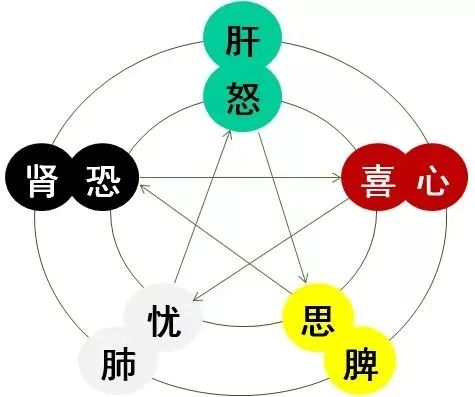

Time has Five Seasons
.09

Spring is suitable for ascending and nourishing: In spring, Yang Qi begins to emerge, the earth revives, and all things grow upwards. It corresponds to the liver, and according to the characteristics of spring, one should use mulberry leaves, chrysanthemum, ginger, and other ascending and dispersing products to fully mobilize the body’s Yang Qi, harmonizing Qi and blood.
Summer is suitable for cooling and nourishing: In summer, the heat is intense, and the fire evil is rampant, with all things flourishing. It corresponds to the heart, and during summer, the Qi and blood of the body’s organs are vigorous. One should use honeysuckle, lotus leaves, and lotus seeds, which are light and cooling, to regulate the body’s Yin and Yang Qi and blood.
Late summer is suitable for light nourishment: Late summer is the transition between summer and autumn, with heat descending and humidity rising. It corresponds to the spleen, and one should use adzuki beans, mung beans, and patchouli to lightly drain and strengthen the spleen, ensuring the source of Qi and blood generation.
Autumn is suitable for cooling nourishment: In autumn, Yang Qi retracts, and Yin Qi grows, with dry weather. It corresponds to the lungs, and at this time, the five organs have just recovered from the vigorous metabolism of summer. One should use lilies, black sesame, and other products that nourish Yin and generate fluids to regulate the dysfunction of the organs from summer.
Winter is suitable for warming nourishment: In winter, the weather is cold, and Yang Qi is deeply hidden. It corresponds to the kidneys, and one should use longan, walnuts, and donkey-hide gelatin to warm and nourish the body’s Qi and blood deficiency, ensuring the organs’ Qi and blood are vigorous and adapting to changes in the natural world.
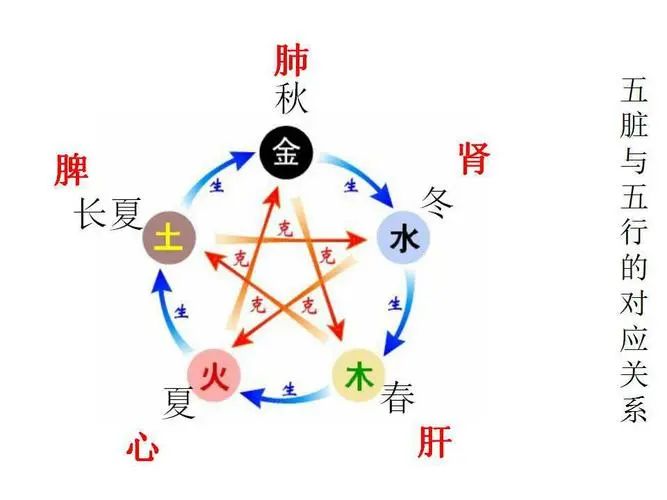
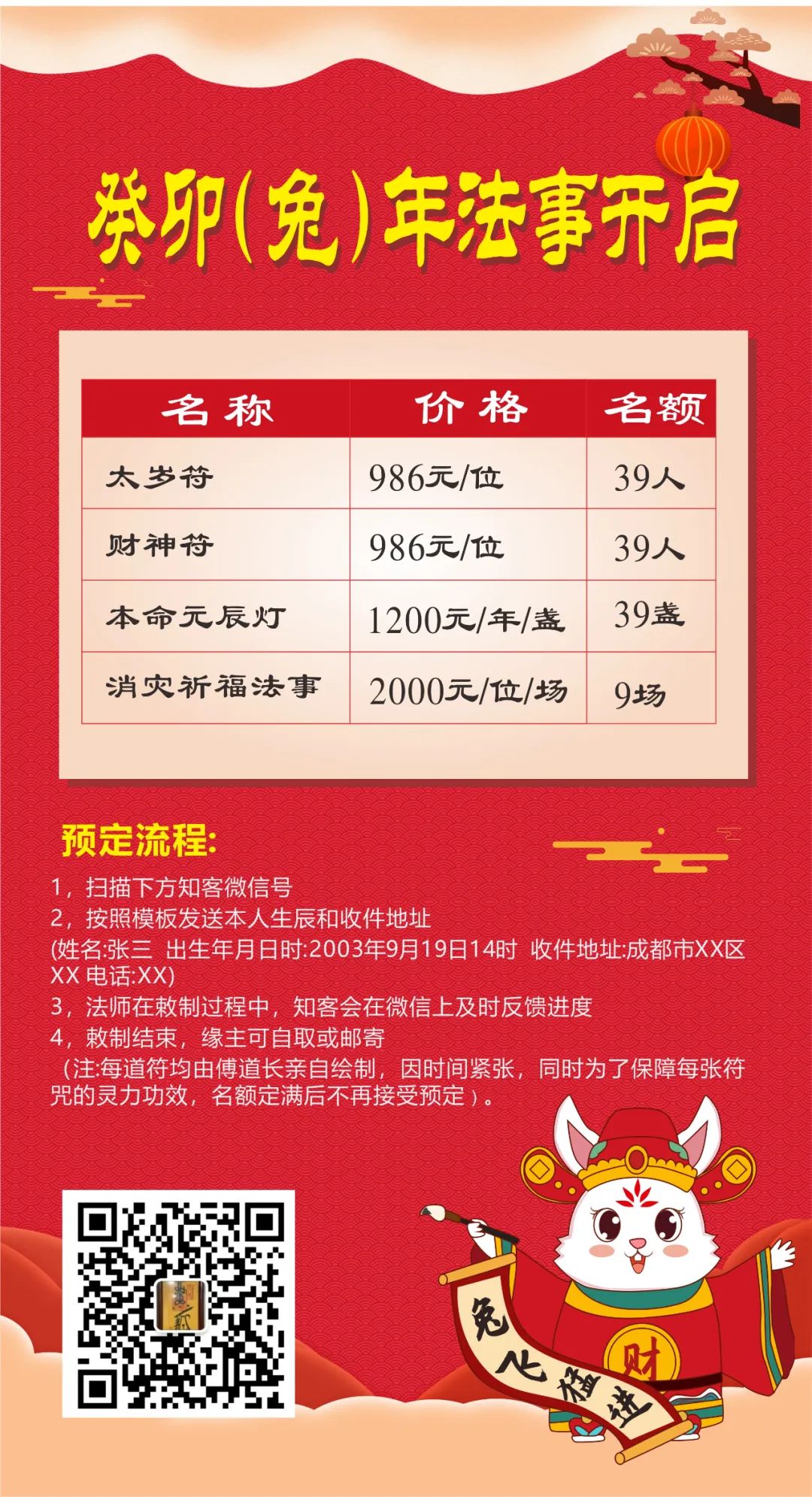
Sharing Brings Great Merit
All merits from sharing this article are dedicated to the sharer and all readers.
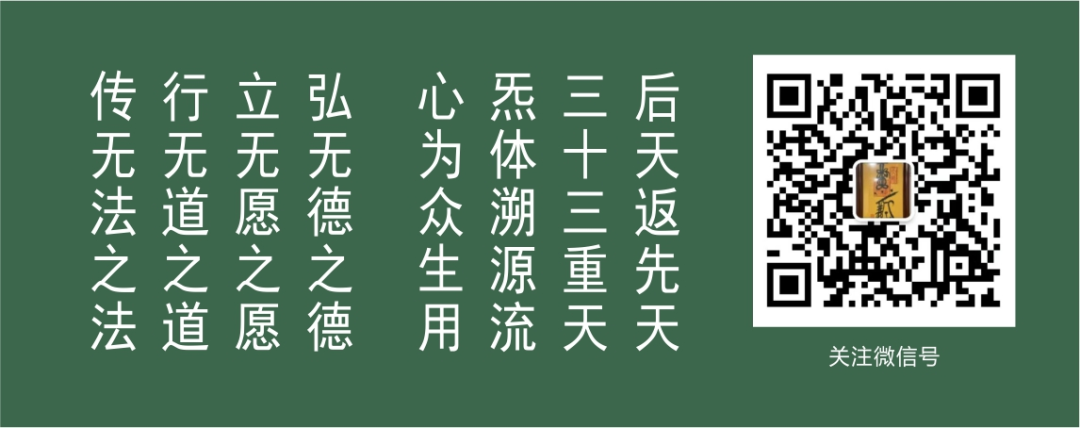

Editor’s Note

⊙ Some images and texts are sourced from the internet; if there is any infringement, please contact for removal.
⊙ Share to your circle of friends, encourage good and discourage evil, and gain great merit.

